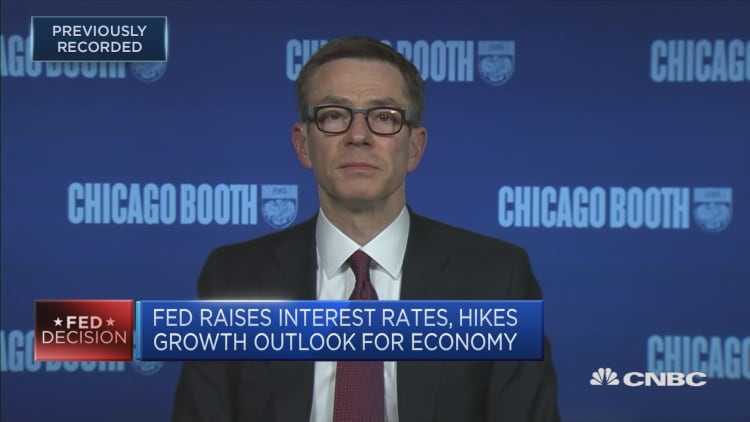
Perhaps people should be more concerned about the strong economy — at least that's what former Federal Reserve governor Randy Kroszner says.
"There's a lot of enthusiasm in markets, but the thing that worries me the most is that people don't seem to be worried," Kroszner told CNBC's "Squawk on the Street" on Friday.
As of now, the markets are rallying and the economy is robust with apparently no end in sight. But some economists think the economy is at or near full employment and worry about a possibility of overheating growth.
Earlier on Friday, Dallas Fed President Robert Kaplan told CNBC, "We're going to overshoot full employment."
"The history of overshooting full employment in this country has not been a happy one," leading to an "overheating" and the Fed playing catch up, Kaplan said. "What happens then is you tend to often have a recession."
Meanwhile, Kroszner also sees the low volatility in the markets as possibly troublesome.
There should be at least average volatility "given all the geopolitical risks, given a lot of uncertainty with respect to policies," said Kroszner, a professor of economics at the University of Chicago. But so-called synchronized global growth, which he said is rare, is contributing to the steady growth and confidence levels.
Kroszner said the new Republican tax overhaul, which President Donald Trump signed into law last month, is a positive sign both short- and long-term.
"We've had a very slow investment recovery," he said. "If you have better investment incentives and investment-friendly regulatory environment, you're likely to get more investment, which will lead to higher productivity, and that increases long-run growth."
But the tax plan has a greater impact than just taxes.
"This is a very goofy time in the economy cycle to be trying to spur the economy with that type of stimulus with the [low] unemployment rate," Luke Tilley, chief economist at Wilmington Trust, told CNBC on Friday. "Firms are having a hard time finding people. A tax plan that spurs the economy can be inflationary because you already don't have a lot of slack in the economy."


